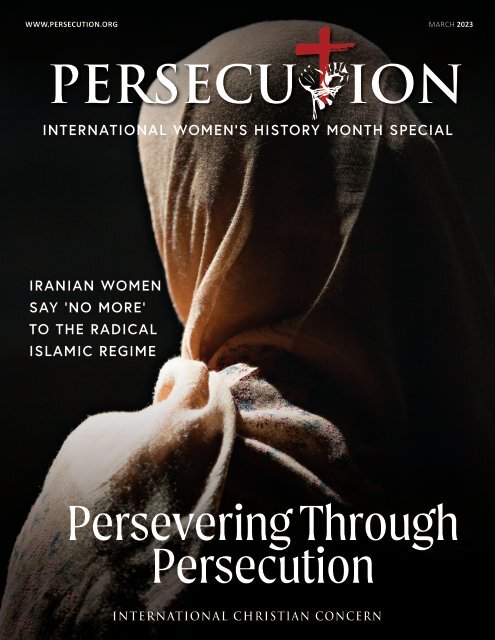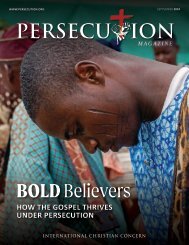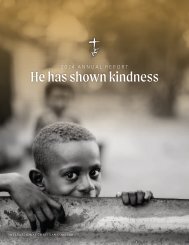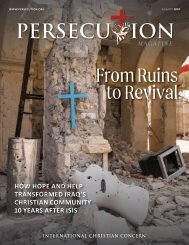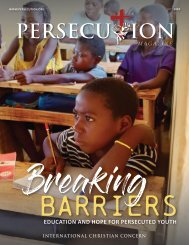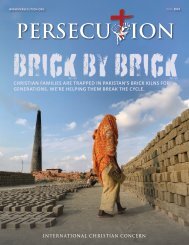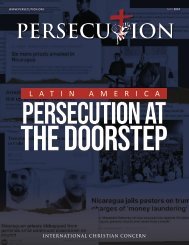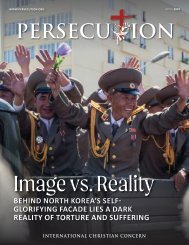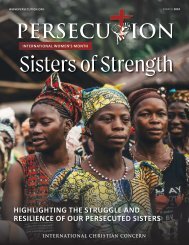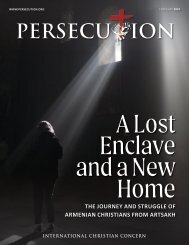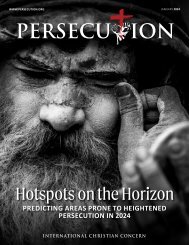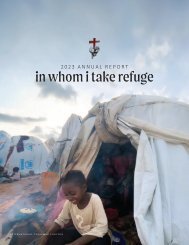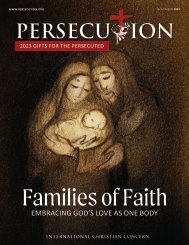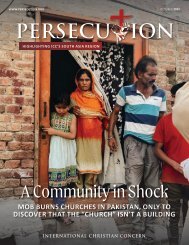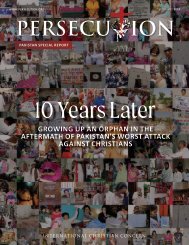March 2023 Persecution Magazine
Create successful ePaper yourself
Turn your PDF publications into a flip-book with our unique Google optimized e-Paper software.
WWW.PERSECUTION.ORG<br />
MARCH <strong>2023</strong><br />
PERSECU ION<br />
INTERNATIONAL WOMEN’S HISTORY MONTH SPECIAL<br />
PERSECU ION<br />
IRANIAN WOMEN<br />
PERSECU ION<br />
SAY ‘NO MORE’<br />
TO THE RADICAL<br />
ISLAMIC REGIME<br />
PERSECU ION.ORG<br />
INTERNATIONAL CHRISTIAN CONCERN<br />
Persevering Through<br />
PERSECU ION.ORG<br />
INTERNATIONAL<br />
<strong>Persecution</strong><br />
CHRISTIAN CONCERN<br />
PERSECU ION.ORG<br />
INTERNATIONAL CHRISTIAN CONCERN<br />
PERSECUTION.ORG 1
Contents<br />
MARCH <strong>2023</strong><br />
ON THE COVER<br />
An unidentified woman wearing a<br />
hijab symbolizes the thousands of<br />
women protesting in the cultural<br />
movement happening in Iran.<br />
Read more on page 10.<br />
Photo: iStock.com/Ozbalci<br />
FEATURES<br />
08 10 14 16<br />
THE BRAVEST<br />
WOMEN WE KNOW<br />
CUTTING THROUGH<br />
THE SILENCE<br />
MY CHRIST<br />
CANNOT FAIL ME<br />
A CAPTIVE<br />
GENERATION<br />
Lessons from<br />
persecuted women.<br />
Decades of persecution<br />
and oppression<br />
catapulted a movement<br />
toward freedom.<br />
ICC comes alongside a<br />
mother who was kicked<br />
to the curb by her Muslim<br />
husband.<br />
Kidnapped Christian<br />
girls are forced to raise<br />
the next generation of<br />
terrorists.<br />
RECURRING<br />
04<br />
06<br />
“SHE SPEAKS WITH WISDOM, AND FAITHFUL<br />
INSTRUCTION IS ON HER TONGUE.”<br />
YOUR HANDS AND FEET<br />
ICC NEWSROOM<br />
PROVERBS 31:26<br />
ICC Projects Made Possible by Supporters<br />
Your Source for <strong>Persecution</strong> News<br />
@persecuted @persecutionnews @internationalchristianconcern International Christian Concern<br />
OUR MISSION: Since 1996, ICC has served the global<br />
persecuted church through a three-pronged approach of<br />
advocacy, awareness, and assistance. ICC exists to bandage<br />
the wounds of persecuted Christians and to build the church<br />
in the toughest parts of the world.<br />
DONATIONS: International Christian Concern (ICC) is a nonprofit 501(c)(3) (all<br />
donations tax-deductible). ICC makes every effort to honor donor wishes in regards to<br />
their gifts. Occasionally, a situation will arise where a project is no longer viable. ICC<br />
will redirect those donated funds to one of our other funds that is most similar to the<br />
donor’s original wishes.<br />
2<br />
MEMBER<br />
<strong>Persecution</strong> | MARCH <strong>2023</strong><br />
© Copyright <strong>2023</strong> ICC, Washington, D.C., USA. All rights reserved.<br />
Permission to reproduce all or part of this publication is granted<br />
provided attribution is given to ICC as the source.<br />
STAFF<br />
Publisher Jeff King<br />
Editor Mike Anderson<br />
Designer Hannah Campbell
The Persecuted Mary’s of Our Day<br />
Jesus elevated women to a place that they hadn’t<br />
possessed in the past.<br />
Look in the Gospels, and you will see his love for<br />
and tenderness with the Samaritan woman at the<br />
well and the woman to be stoned for adultery. Look<br />
at his close relationship with sisters Mary and Martha;<br />
they were his co-laborers in the faith.<br />
Finally, in a plan that perhaps most clearly reveals<br />
His value of women, He arranged for a woman to<br />
be the one to discover that He had risen. He chose<br />
Mary to be the one to inform the male apostles of<br />
the resurrection. He chose her to spread the word<br />
that everything had changed.<br />
This month, we examine the topic of women and<br />
persecution. We start in Iran, where you will learn<br />
about the government’s treatment of the women<br />
they consider enemies.<br />
For years I have told you how the Iranians have<br />
treated arrested female Christian church workers<br />
(brutal doesn’t come close to describing what they<br />
do). Recently, Iranian authorities tortured and killed<br />
a non-Christian woman for not properly following<br />
the rules of Islam, starting a wave of protests to ban<br />
the oppressive laws.<br />
From there, we will go around the world and highlight<br />
Christian women’s hardships. They often exist<br />
as second-class citizens in their cultures because<br />
they are women. But add “Christian” to their status,<br />
and they drop to the bottom of society in cultures<br />
hostile to Christianity.<br />
And that’s where you and I come in. When Christian<br />
women are kicked to the curb by their radical Muslim<br />
husbands for turning to Christ, we are their safety<br />
net. When their Christian husbands are murdered<br />
for their faith or thrown into prison, we rescue the<br />
family.<br />
We can’t save and help every hurting woman, but<br />
we are your faithful hands and feet to intervene<br />
where the Lord leads.<br />
Finally, despite what narrative our culture pushes,<br />
the Lord made ‘male’ and ‘female’ genders; with<br />
equal, clear, distinct gifts, roles, and abilities—but<br />
I won’t take us down that rabbit trail. Today, we<br />
celebrate the ones Jesus chose and loved, women!<br />
May God bless you for holding the hand of those<br />
who desperately need comfort.<br />
In Him. JEFF<br />
Jeff King, President<br />
International Christian Concern<br />
Author: The Last Words of the Martyrs and<br />
Islam Uncensored<br />
PERSECUTION.ORG 3
Your Hands and Feet<br />
ICC PROJECTS MADE POSSIBLE BY SUPPORTERS<br />
Sharing<br />
the Gospel<br />
to the<br />
Ends of<br />
the Earth.<br />
AFRICA<br />
Nurturing a Network<br />
of Churches<br />
GOSPEL: BIBLES & BROADCASTS<br />
Solomon is an evangelist who focuses on reaching and discipling<br />
Muslims in an ocean-side city in Tanzania. Solomon helped<br />
start 14 churches and small groups in the region with several<br />
underground believers.<br />
ICC provided him with a motorbike to be able to travel to the<br />
many churches and groups he disciples.<br />
“I would like to thank God for blessing me with the gift of this<br />
motorbike. In fact, this transport has been very much needed in<br />
the ministry here, that is, the people who have accepted Jesus as<br />
Lord and Savior in their lives,” Solomon said. “This motorbike has<br />
come to relieve the difficulty of traveling to the many villages.”<br />
4<br />
<strong>Persecution</strong> | MARCH <strong>2023</strong>
MIDDLE EAST<br />
In Times of War<br />
RESCUE: WIVES & KIDS<br />
Marie, her husband, and two sons live in a one-bedroom hostel far<br />
away from the home they once knew. The war against Christians in<br />
Artsakh drove them out of their home. They do what they can to<br />
make the best of their new living situation.<br />
The bedroom hostel was not designed for long-term living. Marie<br />
keeps all her food in boxes since there is no cupboard in the kitchen.<br />
They have a closet, but it is not enough for four of them, so their<br />
clothes are stored on what little floor space they have.<br />
ICC helped the family by supplying kitchen cupboards and a wardrobe<br />
to make things more comfortable while their future remains a<br />
mystery.<br />
SOUTH ASIA<br />
Laborers in the Harvest<br />
GOSPEL: BIBLES & BROADCASTS<br />
Many pastors in India possess tremendous enthusiasm to share<br />
the gospel to the ends of the earth. However, they often lack the<br />
resources to do so.<br />
One of ICC’s flagship projects for the past few years is Bikes<br />
and Bibles, an initiative to empower and equip 1,000 church<br />
planters to reach rural India. ICC supplies a bicycle and 100 New<br />
Testaments to each church planter.<br />
In 2022, we concluded our ninth phase of this project, where we<br />
supplied 98 rural church planters across seven states. In total,<br />
we’ve equipped 1,383 pastors. Many of these church planters<br />
serve in difficult areas where preaching the gospel invites<br />
harassment and threats from Hindu radicals. In the last nine<br />
years, since the pro-Hindu Bharatiya Janata Party (BJP) assumed<br />
power, religious minority persecution has more than tripled.<br />
PERSECUTION.ORG 5
ICC Newsroom<br />
YOUR SOURCE FOR PERSECUTION NEWS<br />
Anti-Christian<br />
Riots in India Surge<br />
Across 20 Villages<br />
Radical Hindu nationalists attacked Christians in<br />
20 villages in the Narayanpur and Kondagaon<br />
districts in the Chhattisgarh state of India for<br />
refusing to re-convert from Christianity to Hinduism.<br />
“These incidents have shocked the entire Christian<br />
community in the state, and the sad thing is that the<br />
people in authority did not bother to help,” said a local<br />
church leader.<br />
The attacks took place on Sunday, Dec. 18, as<br />
Christians gathered for worship. The attackers looted<br />
and destroyed the homes of many Christians and<br />
desecrated three churches. Several people were<br />
severely injured and hospitalized while others fled to<br />
the jungle or nearby police stations.<br />
Dozens of Christians Killed or<br />
Abducted by Extremists in Nigeria<br />
On Christmas Day, Fulani militants attacked an Angwan Aku<br />
Village church in Kaduna state, in northern Nigeria.<br />
“The church worship service was about to commence when<br />
the attackers arrived at the village riding on motorbikes<br />
and shooting sporadically,” a resident said. “They killed one<br />
Christian and kidnapped 53 other Christians who are still<br />
held captive.”<br />
Please pray for the families of Christians whom the violent<br />
Fulani militants have murdered and the safe return of those<br />
whom they have kidnapped.<br />
6<br />
<strong>Persecution</strong> | MARCH <strong>2023</strong>
HEAD TO OUR WEBSITE, PERSECUTION.ORG, FOR THE LATEST NEWS<br />
Christian<br />
Genocide Warning<br />
in Artsakh<br />
On Monday, Dec. 12, Azerbaijan<br />
started a blockade on the roads<br />
connecting Nagorno-Karabakh<br />
(Armenian: Artsakh) to all outside<br />
resources. This is the second time<br />
they have done this in the past<br />
month, and it is crippling for the<br />
Armenian people, as “the road<br />
known as Lachin Corridor is the only<br />
road connecting Karabakh to the<br />
outside world,” according to Lilit<br />
Shahverdyan from the Eurasianet<br />
news source.<br />
BREAKING NEWS<br />
Church Bombing Kills 17 in the Congo<br />
Although Azerbaijan claims the<br />
blockade of this road to be for<br />
environmental reasons, this is<br />
clearly a ruse to gain further<br />
control over the people of Artsakh<br />
and eventually finish the religious<br />
cleansing that they have been open<br />
about working toward.<br />
Suspected Allied Democratic Forces<br />
(ADF) rebels detonated a homemade<br />
improvised explosive device (IED), killing<br />
at least 17 and injuring dozens more at<br />
a church in Kasindi, Eastern Democratic<br />
Republic of Congo, Sunday morning,<br />
Jan. 15. Hundreds of Christians were<br />
gathered for prayer and baptism when<br />
the blast went off at 11 a.m.<br />
“Limbs and other body parts are<br />
scattered everywhere as more dead<br />
bodies are being retrieved from the<br />
rubble. Many people have been injured,<br />
and they are being evacuated. We are<br />
not able to ascertain how this attack<br />
happened or how many Christians have<br />
been killed, but I can confirm that this<br />
is a gruesome terrorist attack,” he said.<br />
One of the first responders, a pastor of<br />
a nearby church, reported the attack to<br />
ICC.<br />
India’s Supreme Court Affirms Religious Freedom<br />
The Supreme Court of India affirmed the religious freedom rights of Indian citizens<br />
by rejecting a petition calling for a nationwide law against religious conversion. In<br />
making its decision, the Court stated that persons above the age of 18 in India are<br />
free to choose the religion of their choice.<br />
PERSECUTION.ORG 7
L E S S O N S F R O M<br />
P E R S E C U T E D W O M E N<br />
The Bravest<br />
Women We Know<br />
B Y H A N N A H C A M P B E L L<br />
8<br />
<strong>Persecution</strong> | MARCH <strong>2023</strong>
It’s the mother just kidnapped alongside her<br />
toddler, fighting to make it out alive who<br />
teaches us determination. It’s the daughter<br />
whose parents were murdered by a suicide<br />
bomber in the foyer of her home, right in front<br />
of her, who teaches us courage. It’s the wife,<br />
whose husband was killed by radical Islamic<br />
militants for his faith who teaches us to rely<br />
on our strength in the Lord. It’s the sister who<br />
dreams of becoming a surgeon and helping<br />
the persecuted and pursues her education,<br />
who teaches us the power the next generation<br />
possesses. And it’s the orphaned baby whose<br />
community takes her in their loving arms to<br />
raise her who inspires hope.<br />
These are the stories and the lessons from<br />
persecuted Christian women around the<br />
world. They are some of the most courageous<br />
and resilient humans you will encounter, and<br />
their grit is stronger than that of a pearl.<br />
We find her worshiping in the midst of<br />
unimaginable grief and despair, with tears<br />
in her eyes and arms lifted high. She is the<br />
backbone of her family, her church, and her<br />
Christian community. In the darkest corners of<br />
the world, her light shines bright.<br />
A COMPLEX REALITY<br />
It’s often easy to think of persecution in its<br />
most blatant form; instances that are visible<br />
and severe, like beatings or murders. The<br />
target for these types of attacks are mainly<br />
Christian men.<br />
For centuries, however, women of faith<br />
have experienced complex and often hidden<br />
persecution from their culture and extremists.<br />
And for more than two decades, ICC has<br />
served suffering Christians at the front lines of<br />
persecution ministry.<br />
BRINGING INJUSTICE TO LIGHT<br />
But lately, we’ve seen courageous women<br />
bring to light injustices in Iran after the death of<br />
Mahsa Amini. Her death and the circumstances<br />
surrounding it sparked a nationwide protest<br />
with Iranians from all ethnic and religious<br />
backgrounds taking to the streets.<br />
Women have been the central leaders of the<br />
protest with nothing to lose and everything to<br />
gain.<br />
GOD IS AT WORK<br />
Throughout the Bible, God placed women in<br />
strategic locations to carry out His will and to<br />
bring peace and justice into this world. Some<br />
He gave positions of authority and power, while<br />
others, He humbled to the lowest positions of<br />
society: all to be elevated for His glory.<br />
And God is writing that same story today<br />
through the brave, humble, and strong women<br />
who bring the light of Christ to the darkest<br />
corners of the world.<br />
A W O M A N W H O F E A R S<br />
Photo: Miguel Bruna / Unsplash<br />
T H E L O R D I S T O B E<br />
P R A I S E D . Proverbs 31:30<br />
PERSECUTION.ORG 9
Cutting<br />
Through the<br />
Silence<br />
By Joseph Daniel, ICC Regional Manager for the Middle East<br />
10<br />
<strong>Persecution</strong> | MARCH <strong>2023</strong>
DECADES OF<br />
PERSECUTION<br />
AND<br />
OPPRESSION<br />
CATAPULTED<br />
A MOVEMENT<br />
TOWARD<br />
FREEDOM.<br />
Photo: Craig Melville / Unsplash<br />
Simply the mention of Iran in<br />
the international media evokes<br />
a certain level of controversy<br />
and alarm. But how did the Middle<br />
East’s second-largest nation go<br />
from an Islamic revolution to an<br />
unprecedented protest movement?<br />
And how did its Christians go from a<br />
small, persecuted minority to one of<br />
the world’s fastest-growing churches<br />
today?<br />
PERSECUTION IN IRAN<br />
When the Iranian revolutionaries led<br />
by Ayatollah Khomeini seized power<br />
in 1979, they immediately pushed<br />
to rid the country of any foreign<br />
Christian elements, ending all formal<br />
foreign missionary efforts. Ethnic<br />
Christian groups inside Iran, such as<br />
Armenian and Assyrian churches,<br />
were offered some protection and<br />
recognition predicated on their<br />
support for the new government.<br />
However, starting in the 1990s,<br />
another group of Christians in Iran<br />
have emerged consisting of Iranian<br />
converts from Islam through a rapidly<br />
growing “house-church” movement.<br />
PERSECUTION.ORG 11
12<br />
<strong>Persecution</strong> | MARCH <strong>2023</strong>
An independent survey in 2020 revealed an<br />
estimation of close to a million Christians in<br />
Iran today with most of them being converts.<br />
This incredible growth is occurring despite<br />
the intense persecution Christians continue<br />
to live under. The regime attempts to publicly<br />
silence Christians’ faith. All Farsi Bibles and<br />
Christian literature are banned; sharing one’s<br />
faith with others is outlawed; Christian groups<br />
are constantly monitored by authorities,<br />
and pastors have consistently been arrested,<br />
interrogated, and imprisoned.<br />
Dabira Bet Tabriz, a leading voice around<br />
the world for religious freedom in Iran since<br />
her own Assyrian-Iranian family suffered<br />
immense persecution for their leadership in<br />
Faris-speaking church activities, shared in an<br />
interview with ICC what it is like to live as a<br />
Christian in Iran.<br />
“If you are an Evangelical, a Protestant, you<br />
are considered a Zionist, a terrorist; you have<br />
no right to practice your belief, to assemble<br />
within a church. You have no right to worship,<br />
and this is [speaking of] mainly of Assyrians and<br />
Armenians. However, converts are the largest<br />
Christian group in the country, but they are not<br />
a recognized religious minority and have no<br />
right to freedom [in Iran].”<br />
She further shared that most converts are<br />
women which exposes them to additional<br />
discrimination and abuses, with reports of<br />
the government employing humiliating and<br />
inhumane interrogation and psychological<br />
torture techniques against Christian prisoners.<br />
“WOMEN, LIFE, LIBERTY”<br />
In September 2022, a 22-year-old Kurdish-<br />
Iranian woman named Mahsa Amini visited<br />
family members in Tehran, the capital city of<br />
Iran. The notorious morality police arrested<br />
her under charges of not properly wearing the<br />
hijab, the Muslim headscarf. While detained,<br />
the morality police reportedly brutally tortured<br />
Mahsa who fell into a coma and died 3 days<br />
later. This tragic incident sparked a nationwide<br />
protest movement with Iranians from all ethnic<br />
and religious backgrounds taking to the streets<br />
in dozens of Iranian cities.<br />
While most street-level protests are not new<br />
in Iran, previous protests would only last a<br />
few weeks before being ended by authorities.<br />
However, these recent protests have continued<br />
for months with estimations of 500 protestors<br />
killed, including several “fast-track” trials<br />
leading to executions of protestors charged<br />
with “waging a war on God” for their activities<br />
during the protests.<br />
Women, especially young women and even<br />
children, have courageously been central<br />
leaders of the protests with a strong sense that<br />
they have nothing to lose and eventually their<br />
freedom to gain.<br />
In solidarity with Mahsa Amini, the foundational<br />
slogan from the beginning of the protests<br />
has been “Women, Life, Liberty,” illustrating<br />
the nationwide, united frustration with the<br />
authoritarian regime’s oppressive system of<br />
dictating the everyday lives of women, brutally<br />
killing dissidents, and depriving its citizens<br />
of the freedom to determine their own life<br />
decisions.<br />
HOPE FOR IRAN<br />
Dabrina further shared with ICC, that<br />
considering the decades of persecution and<br />
oppression as well as all the events of the<br />
past few months, “We are hopeful that this<br />
regime will change. We are hopeful that they<br />
are breathing their last breath. We don’t know<br />
when. But this is our hope, our prayer, our fight.<br />
But as believers, we have a different hope,<br />
a bigger point of view, a different strength to<br />
carry on.”<br />
Christians suffering persecution for so long are<br />
raising their voices in union with their fellow<br />
Iranians for freedom, peace, and justice in their<br />
nation. The Iranian regime’s long history of<br />
efforts to brutally silence the spread of the hope<br />
of the gospel has failed, and in such tumultuous<br />
times as this, that hope desperately needs to<br />
shine more brightly than ever for the people of<br />
Iran.<br />
A N D W H O K N O W S B U T T H A T Y O U<br />
H A V E C O M E T O Y O U R R O Y A L<br />
P O S I T I O N F O R S U C H A T I M E A S<br />
T H I S ? Esther 4:14 (NIV)<br />
PERSECUTION.ORG 13
My Christ Cannot<br />
Fail Me<br />
14
ICC COMES ALONGSIDE A MOTHER WHO WAS<br />
KICKED TO THE CURB BY HER MUSLIM HUSBAND.<br />
Women who grow up in a Muslim household are<br />
often at the mercy of the men they are married off<br />
to. They typically lack the education and resources<br />
to make it on their own as single women due to cultural<br />
norms and standards.<br />
Many Muslim women who come to faith in Christ are faced<br />
with the painful decision to share their faith and risk losing<br />
everything or stay underground and live an outward lie. And<br />
to add to the pressure, these women are often mothers, and<br />
their marriage provides their children with the support and<br />
security they need to thrive.<br />
Jane was 26 years old when she was married. Her husband<br />
treated her well for the first eight years until he married two<br />
more women and began to severely mistreat her.<br />
The situation steadily worsened over the next five years,<br />
culminating in her husband’s refusal to pay for the basic<br />
needs of Jane and her children in 2020. Desperate for a<br />
source of income to cover her children’s food, clothes, and<br />
school fees, Jane attempted to start her own business.<br />
However, it ultimately failed due to a lack of starting capital.<br />
For two years, she and her children continued to struggle<br />
greatly. Her husband still allowed them to live in his home,<br />
but his constant abuse made their lives miserable.<br />
In May 2022, Christian preachers came to her town and<br />
shared the gospel with her. They told her to cast her burdens<br />
onto Jesus, and at that moment, Jane decided to trust in<br />
Jesus and became a Christian.<br />
“After receiving Christ, I went back home and told my<br />
husband. The only answer I received from him was that he<br />
should not find me at the house when he returned from<br />
Muslim prayers, but I thought it was a joke,” Jane said.<br />
“When he returned home, he asked me if I had become a<br />
Christian. I said yes, but before I could finish speaking, he<br />
slapped my face and pulled me out of bed. He pushed me<br />
outside the house and started throwing my things after me.<br />
He went back inside, woke up my four kids, and told them<br />
to go outside with their stupid mother who had decided to<br />
become a Christian.”<br />
He told them mockingly, “Let her take you to her Jesus.”<br />
Jane and her children spent the night outside, not knowing<br />
what to do next.<br />
“He said he would accept us again only if I denied Christ and<br />
returned to his religion. I could not do that because I knew<br />
the Christ I received could not fail me,” Jane said.<br />
Jane and her children ended up staying at a Christian friend’s<br />
house temporarily but they then pressured her to leave after<br />
a few weeks.”<br />
An ICC staff member heard about Jane’s situation and in<br />
September 2022, ICC sent her the funds to rent and stock a<br />
retail shop with a house attached. It was the startup capital<br />
she previously lacked.<br />
In response, Jane said, “I thank God for this shop. My<br />
salvation is not in vain now because God has done it for me.<br />
I am so excited that I have received my dream. I have desired<br />
to own my shop for years, and now I have one. My life will<br />
change with this shop, and I will do my best to make it work<br />
no matter what.”<br />
ICC equips dozens of women around the world every year<br />
who have been kicked to the curb because they chose to<br />
speak up about their faith.<br />
Photo: Sheha Sirarajan / Unsplash<br />
WHEN WOMEN ARE DEEMED WORTHLESS<br />
Women’s bodies have become a second battlefield, and<br />
perpetrators weaponize sexual violence to further their<br />
power and agenda. Sexual violence infiltrates nearly every<br />
culture in the world to some degree, and Christian women<br />
who are minorities are more prone to this type of persecution.<br />
It is a means of control, power, and dominance to establish<br />
Christian women as inferior, weak, and helpless.<br />
In many societies, a women’s sexual purity equates to her<br />
worth. The loss of that purity brings dishonor to herself and<br />
her family and leaves her an outcast in her community. In<br />
some countries, radical Muslim men weaponize that to force<br />
marriage and conversion. To compound the shame, they<br />
often blame the women for the violence brought against<br />
them.<br />
ICC seeks to rescue the girls who have been cornered into<br />
marriage and to restore dignity to all those who have been<br />
dehumanized because of their gender and religion.<br />
PERSECUTION.ORG 15
A Captive Generation<br />
KIDNAPPED CHRISTIAN GIRLS ARE FORCED TO<br />
RAISE THE NEXT GENERATION OF TERRORISTS<br />
The focal point for the Christmas Day service was<br />
supposed to be about the birth of our Lord and<br />
Savior. But the morning quickly took a turn for the<br />
worse when radical Fulani militants stormed the service<br />
with echoes of gunshots and screams in Angwan Aku<br />
Village in Kaduna state.<br />
“The church worship service was about to commence<br />
when the attackers arrived at the village riding on<br />
motorbikes and shooting sporadically,” a resident who<br />
witnessed the attack said.<br />
Fulani militants killed one Christian and kidnapped 53<br />
other Christians who, at the time of writing this article,<br />
are still held captive.<br />
“Family life has been disrupted; the lucky survivors have<br />
become refugees in their land waiting for palliatives in<br />
an endless genocide they can’t understand,” continued<br />
the witness. “Mass graves litter the community and<br />
countryside. Our people can no longer go to their farms<br />
for fear of being gunned down or macheted.”<br />
TARGET ON THEIR BACKS<br />
The fear of Fulani militants runs deep in many northern<br />
Nigerian villages. The attackers are ruthless and will<br />
destroy property, kidnap indiscriminately, and kill anyone<br />
they deem.<br />
Christian women, especially Christian girls, have a<br />
tremendous target on their backs. Terrorists, like the Fulani<br />
militants and Boko Haram, target schools and villages and<br />
kidnap young girls to convert to Islam. Women are viewed<br />
as the source of the next generation – those who birth and<br />
care for the children in the community. Because of this,<br />
they are kidnapped, converted to Islam, and sold as brides<br />
for militant leaders to use to raise their own generation.<br />
Their one evil goal is to stop Christianity at its source.<br />
MOTHER TAKES A STAND<br />
Fulani militants attempted to rape a 16-year-old Christian<br />
girl one morning while she was walking with her mother<br />
to their farmland in Nkiendonwro village, roughly 20 miles<br />
from Jos, the capital of Plateau state.<br />
An ICC contact visited the family after the attack and spoke<br />
with the victims. “They told us to stop,” said the girl’s<br />
mother. “Then the Fulani [militants] beat me and injured<br />
me… I was trying to stop them from raping my daughter.”<br />
As she spoke, the mother kept her arm raised, revealing a<br />
deep gash she suffered from the militants.<br />
16<br />
<strong>Persecution</strong> | MARCH <strong>2023</strong>
Above: A mother receives aid to send her daughter to<br />
school after she saved her daughter from an attempted<br />
rape by Fulani militants.<br />
The woman explained that the Fulani militants had seized<br />
her land and burned down her house in 2017, forcing her<br />
and her family to move closer to the city for their safety. No<br />
longer having their farmland has caused the family of seven<br />
to fall into deep poverty, where they currently live and sleep<br />
in a one-room home.<br />
ICC INTERVENES<br />
ICC’s contact in Nigeria did not speak to the minor, as she was<br />
traumatized and crying throughout the visit. The mother said<br />
God used her to protect her daughter from public disgrace<br />
and shame, which is often how victims of rape are viewed in<br />
their society.<br />
“I have nothing to say but thank God,” said the mother.<br />
“Please tell Christians to pray for me and my daughter. Pray<br />
that we will return to our village one day because life is too<br />
expensive for us in the city.”<br />
Nkiendonwro village was deserted in 2017 after 29 Christians<br />
were killed by Fulani militants in a classroom massacre. Since<br />
then, the militants have occupied the land, and Christians<br />
don’t have access to their farms and homes despite a series of<br />
peace meetings with the Fulani leaders. Out of desperation,<br />
many villagers try to return to their farmlands to retrieve<br />
resources, such as firewood, for survival.<br />
ICC helped the family with financial assistance and provided<br />
housing and a small business startup.<br />
FORCED TO FIT A MOLD<br />
ICC conducted trauma training session for Generation<br />
Transformation students last year.<br />
The girls shared the gender inequalities they faced in their<br />
own families. “Parents impose unnecessary restrictions on<br />
us. Our parents start looking for our matches for marriages<br />
instead of focusing on our careers. They prefer if the match is<br />
from any foreign country or aged with wealth, as they want<br />
to secure other siblings’ career at the cost of our choice,” one<br />
girl explained.<br />
“If we succeed in achieving our goals—getting higher<br />
education—then we start facing resistance from our relatives<br />
and in-laws who don’t want girls and women to continue<br />
with their jobs. They want us to focus on establishing families<br />
and showing a servitude attitude,” said another girl.<br />
“Parents and brothers keep us under pressure and impose<br />
their decisions on selection of careers,” she continued. “They<br />
ignore our basic human rights and restrict our mobility,<br />
freedom of choice, and decision-making power which is one<br />
of the factors of our identity crises.”<br />
Generation Transformation seeks to empower students to<br />
break generational cycles of persecution through the power<br />
of education.<br />
PERSECUTION.ORG 17
Human Trafficking and<br />
Religious <strong>Persecution</strong><br />
BY ICC FELLOW LINDA BURKLE, PHD<br />
Throughout my professional career, I<br />
have had the privilege and challenge<br />
of directly working with victims of<br />
human trafficking as well as administering<br />
programs to assist them. The experience<br />
of working with both the justice and social<br />
service systems has exposed me to some<br />
of the most vulnerable cases of human<br />
trafficking, including an eleven-year-old<br />
with a six-month-old infant who was<br />
trafficked by her mother, a woman who was<br />
fleeing from her pimp who had previously<br />
branded her, and a young woman whose<br />
husband convinced her that she would<br />
show her love for him by prostituting<br />
herself and bringing him the money.<br />
In these and many other tragic situations,<br />
the trafficker exercised complete control<br />
over the victim through threats, physical<br />
abuse, deception, deprivation, and<br />
psychological manipulation. Unfortunately,<br />
these characteristics are far too common in<br />
all forms of human trafficking.<br />
HUMAN TRAFFICKING DEFINED<br />
From the 1970s to the 1990s, before the<br />
term “human trafficking” was coined and<br />
understood, the victims of trafficking were<br />
often perceived as a criminal committing<br />
the crime of prostitution and adjudicated<br />
accordingly. This tragically meant that the<br />
“victim” was penalized, and the trafficker<br />
typically faced minimal consequences. It<br />
wasn’t until the early 2000s that the world<br />
recognized the term “human trafficking”<br />
and acknowledged it as a global problem<br />
involving the enslavement of people for<br />
exploitation or profit.<br />
In 2000, the UN General Assembly formally<br />
developed and adopted the definition of<br />
human trafficking at the UN Convention<br />
against Transnational Organized Crime<br />
(the Palermo Convention). The trafficking<br />
of persons was officially defined as “the<br />
recruitment, transportation, transfer,<br />
harboring or receipt of persons, by means<br />
of threat or use of force or other means<br />
of coercion, of abduction, of fraud, of<br />
deception, of the abuse of power or of a<br />
position of vulnerability.” The definition<br />
also recognized that “…exploitation shall<br />
include, at a minimum, the exploitation of<br />
the prostitution of others or other forms of<br />
sexual exploitation, forced labor or services,<br />
slavery, or practices similar to slavery,<br />
servitude, or the removal of organs.” As of<br />
May 2020, 178 countries have ratified the<br />
Trafficking Protocol.<br />
In the same year, modeled after the UN<br />
document, the U.S. government enacted<br />
the Trafficking Victims Protection Act of<br />
2000 (TVPA), which serves as the national<br />
framework for the federal response to<br />
human trafficking.<br />
SCOPE OF HUMAN TRAFFICKING<br />
Human trafficking is modern-day slavery,<br />
generating over $150 billion annually,<br />
slightly eclipsed only by the trafficking<br />
of drugs and weapons. The trafficking<br />
of human beings is uniquely profitable,<br />
however, because they can be sold multiple<br />
times. According to the International<br />
Labour Organization, “40.3 million people<br />
are in modern-day slavery, including 24.9<br />
million who are in forced labor and 15.4<br />
million in forced marriage.”<br />
A few statistics on human trafficking show<br />
that:<br />
There are 5.4 victims of modern-day slavery<br />
for every 1,000 people in the world.<br />
Children make up 1 in every 4 victims of<br />
modern-day slavery.<br />
Out of the 24.9 million people trapped<br />
in forced labor, 16 million people are<br />
exploited in the private sector, such as<br />
through domestic work, construction,<br />
or agriculture; 4.8 million people are in<br />
forced sexual exploitation, and 4 million<br />
are in forced labor imposed by the state<br />
authorities.<br />
Women and girls are disproportionately<br />
affected by forced labor, accounting for<br />
99% of victims in the commercial sex<br />
industry and 58% in other sectors.<br />
THE INTERSECTION OF RELIGIOUS<br />
PERSECUTION AND HUMAN<br />
TRAFFICKING<br />
Per the report referenced above, forced<br />
labor, sexual exploitation, and forced<br />
marriage are the primary reasons<br />
people are trafficked. While 30% of labor<br />
18<br />
<strong>Persecution</strong> | MARCH <strong>2023</strong>
ICC FELLOWS<br />
Photo: Mickael Gresset / Unsplash<br />
trafficking is committed by state actors,<br />
sexual exploitation and forced marriage are<br />
often the results of a society or culture in<br />
which the government may be complicit,<br />
reluctant, or ineffective in protecting<br />
marginalized and vulnerable populations,<br />
such as persecuted Christians. One report<br />
estimates, “In the 50 countries with the<br />
highest level of Christian persecution,<br />
forced marriages of women have increased<br />
by 16 percent.”<br />
Whereas a primary motivator in the human<br />
trafficking industry is profit, trafficking in the<br />
context of religious persecution is uniquely<br />
different. While there may be economic<br />
benefits to trafficking Christians and other<br />
religious minorities, the driving motivators<br />
are religious and cultural. In addition,<br />
perpetrators often use the trafficking<br />
of Christians as a weapon of war and<br />
domination to undermine and destroy the<br />
presence of religious minorities in a specific<br />
geographic region. Thus, human trafficking,<br />
and predominately sex trafficking, are<br />
primary tools for persecution, although<br />
profit may be a secondary factor.<br />
One report on gender-based persecution<br />
found that Christian women and girls<br />
are most adversely impacted among<br />
the countries listed on the World Watch<br />
List (WWL), a ranking list of the top fifty<br />
countries where it is most challenging<br />
to be a Christian. Of the countries on the<br />
WWL, at least 90% reported cases of forced<br />
marriage, and 86% reported sexual violence<br />
as the key instrument for persecution.<br />
The report also identified forced marriage,<br />
sexual violence, physical violence,<br />
psychological violence, and forced divorce<br />
as the five most common “pressure points”<br />
for religious persecution against women<br />
in WWL countries. In addition, the report<br />
found that each category had increased<br />
since the previous year’s study, showing<br />
that “…the rise in psychological violence<br />
mostly affects women and girls, who often<br />
live in fear of attacks or struggle to move on<br />
from the trauma of past physical and sexual<br />
assaults.<br />
“Women are also primarily impacted by the<br />
rise in human trafficking, although bonded<br />
labor and trafficking continue to affect men<br />
and boys too. Sexual violence and forced<br />
marriage are used as tools of shame,<br />
coercion, and control, primarily against<br />
Christian women and girls because of the<br />
strong association of sexual purity with the<br />
honor of a family or community.”<br />
Additionally, reports of psychological<br />
violence among women in these countries<br />
rose from 40% to 74% from the 2020 report<br />
to the 2021 report. Forced marriages<br />
increased by 16%, and physical violence<br />
increased by 20%. The report also found<br />
that forced marriage is most prevalent<br />
in Africa (4.8 per 1000), while the most<br />
significant number of victims are in the Asia<br />
and Pacific regions, accounting for 73% of<br />
victims of forced sexual exploitation.<br />
Some more examples of the intersection<br />
between Christian persecution and the<br />
treatment of women and girls include:<br />
In India, Christian girls are considered “less<br />
than” in a stratified Hindu society. They are<br />
poor and vulnerable to being abducted or<br />
tricked with offers of jobs and a better life.<br />
Impoverished Pakistan Christian girls are<br />
often lured into marrying Chinese men with<br />
promises of security and provision. Young<br />
Chinese men, who are disproportionately<br />
overrepresented in the population<br />
due to the failed one-child policy that<br />
heavily favored males, fuel the lucrative<br />
international bride trafficking business.<br />
In Nigeria, Islamic terrorists continue to<br />
abduct Christian girls despite international<br />
condemnation of the 2014 kidnapping<br />
of Chibok school girls. Most criticize the<br />
Nigerian government for not doing enough<br />
to rescue the victims and bring the traffickers<br />
to justice. Much to the ire of Nigerians and<br />
the international community, some officials<br />
have even referred to identified traffickers<br />
(captors) as “husbands” of abducted and<br />
released girls.<br />
As we pray for our persecuted brothers and<br />
sisters around the world, we also pray for<br />
the victims of human trafficking – they are<br />
often the same.<br />
*Source: Global Estimates of Modern<br />
Slavery: Forced Labor and Forced Marriage,<br />
Geneva, September 2017<br />
PERSECUTION.ORG 19
20<br />
<strong>Persecution</strong> | MARCH <strong>2023</strong>
On the Ground<br />
PERSECUTION AS A CHRISTIAN WOMAN IN PAKISTAN<br />
We interviewed one of our staff members based in Pakistan to get her<br />
personal experience dealing with the dynamics of her faith and gender in the<br />
fundamentalist Islamic country.<br />
This is our conversation:<br />
People in the west often have a view that Pakistan and other Islamic<br />
countries create suffocating cultures for women, especially Christian<br />
women. What has your experience been as a Christian woman living in an<br />
Islamic country?<br />
As a Christian woman living in Pakistan, I feel that there is a certain judgment criterion that precedes my reputation.<br />
A general label regarding the clothing choices of Christian females and how they are an easy target to be persuaded<br />
and invaded for various reasons and purposes. There is always a false perception in the eyes of others in society<br />
that Christian females are liable to be explored in relationships as Christian females have several liberties to exist<br />
within the environment more than Muslim women.<br />
The Christian community faces discrimination in all aspects of life based on their religion, and the discrimination<br />
is supported by the constitution, law, and policies designed by the state. Women are the marginalized segment of<br />
society and being a minority woman is being double jeopardized.<br />
Photo: Shiza Nazir / Unsplash<br />
I faced discrimination at my university while studying at a private university in Lahore. Being the only Christian<br />
student in the electrical engineering department, I faced a lot of discrimination. A teacher deliberately used to give<br />
me an “F” grade because of my faith, and I repeated that course three times during the tenure of that teacher,<br />
failing to secure a grade other than “F.” However, I managed to get an “A” as soon as the teacher was replaced.<br />
PERSECUTION.ORG 21
Have there been situations you’ve found yourself in that have caused you<br />
to fear for your safety because of your faith? If so, could you describe one<br />
of those events?<br />
The moment I learned the gravity of my faith being a danger to my safety was when Salman Taseer was murdered<br />
due to taking a stance for Asia Bibi. A nationwide holiday was announced 12 years ago on the 5th of January for<br />
national mourning for him.<br />
In this nationwide holiday, we learned to mask our true feelings for the case of Asia Bibi and to behave ourselves<br />
in college by not taking part in any discussions. Salman Taseer was a hero in our home, yet when I came to the<br />
horizons of my college, I learned to comprehend the fact that Salman Taseer was a sinner who never deserved<br />
a funeral just for the reason he spoke up for the rights of minorities in Pakistan. I was brought up in a Christian<br />
institution, yet I felt scared in between the walls of that college, for in every corner, I could just listen to the<br />
whispers of how my faith is condemnable theology.<br />
There are so many events that I’ve experienced throughout my life where I’ve felt that my safety would be<br />
jeopardized by my religious identity. On the day Asia Bibi got released, it was nationwide chaos for Christians. Many<br />
of us couldn’t drive with the symbol of a crucifix in our cars; university students, even my sister, were exposed to<br />
this incident of brutal torture.<br />
What would you like people in the West, specifically other sisters in Christ, to<br />
know about Christian women in Pakistan?<br />
In most cases, Christian women in Pakistan are the breadwinners in their households. They are the ones facilitating<br />
and providing for their families, and most of these Christian women are nurses. Christian women in Pakistan are<br />
brave and bold enough to be the witness and source of the true gospel in their workplace and their groups through<br />
their living example. They are sharing Christianity rather boldly through their conduct and demeanor. They are<br />
ambassadors of Christ in the Muslim community of Pakistan.<br />
22<br />
<strong>Persecution</strong> | MARCH <strong>2023</strong>
1 Chronicles 16:11<br />
S E E K T H E<br />
L O R D A N D H I S<br />
S T R E N G T H ,<br />
S E E K H I S F A C E<br />
C O N T I N U A L L Y .<br />
Has working for ICC changed the way you view Christians in your own<br />
country? If so, in what ways?<br />
Working with ICC has become my passion. Reaching out to the vulnerable and weak groups of society makes me<br />
feel good and at least useful and productive. ICC is contributing to the empowerment of the Christian community<br />
of Pakistan. Strengthening them to have education is the most needed and productive way to strengthen the<br />
community.<br />
ICC has provided me an opportunity to interact with the youth that I have found to have the potential to thrive<br />
through the odds. They, despite discrimination, are inching toward their goals. And I think ICC has increased their<br />
pace.<br />
If you could change anything about Pakistan, what would you hope would<br />
change?<br />
I wish my country should be a secular state as declared by the father of the nation Jinha in 1947. It would pave the<br />
way to building a tolerant and pluralistic society.<br />
I hope to change the biased laws in the legislation of Pakistan.<br />
I would turn the law to eliminate the rule of blasphemy that has been a torturous way to punish Christians in our<br />
community. This law has been used to falsely accuse victims just for executing judgment for personal grudges.<br />
PERSECUTION.ORG 23
We’d love to hear from you!<br />
ICC<br />
PO BOX 8056<br />
SILVER SPRING, MD 20907<br />
OR ONLINE AT<br />
WWW.PERSECUTION.ORG<br />
OR BY PHONE<br />
800-ICC-5441<br />
Giving via Will<br />
Provide now for a future gift to ICC by including<br />
a bequest provision in your will or revocable<br />
trust. If you would like more information on<br />
giving to ICC in this way, please give us a call at<br />
1-800-ICC-5441.<br />
PERSECU ION.ORG<br />
INTERNATIONAL CHRISTIAN CONCERN<br />
PERSECU ION.ORG<br />
INTERNATIONAL CHRISTIAN CONCERN<br />
PERSECU ION.ORG<br />
INTERNATIONAL CHRISTIAN CONCERN


